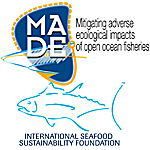Sustainability of living resource exploitation relies on an ecosystem management approach. Within tropical tuna purse seine fisheries using FADs, such an approach incorporates the reduction of bycatch, in particular vulnerable species such as elasmobranchs. The levels of total bycatch (in weight) from fishing operations using FADs is known to be 5 times higher than when tuna are caught in free-swimming schools. We intend to find practical solutions to reduce bycatch in FAD sets through the investigation of the relationships between the ratio of bycatch to target catch across different set size classes in all oceans. Ratios were always highest when catches were small, with the smallest class of catches responsible for the highest total portion of bycatch (23-43%) while only contributing negligibly to the total target catch (3-10%). Reducing the effort whilst maintaining the same total yield could contribute to a significant reduction in the impacts of human activities.
- Presentation

 PDF version
PDF version
